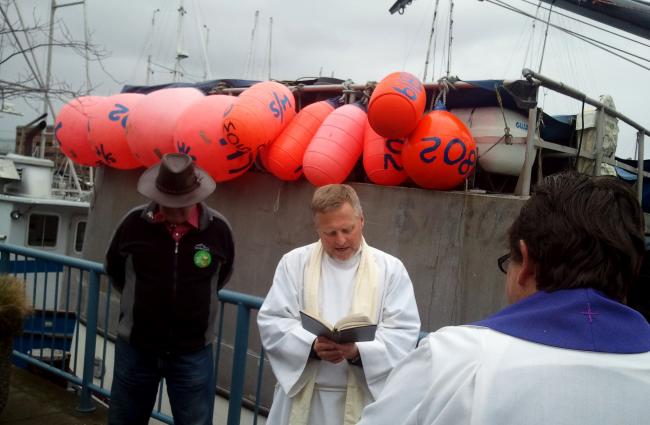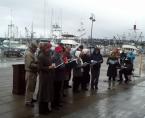A blessing before fleet returns to unpredictable waters
On Sunday afternoon, Ballard Pastor Erik R. Wilson Weiberg led the fishing community in prayer for a safe and fruitful fishing season. The crowd also remembered those lost at sea like four members of the Lady Cecelia crew who died off the coast of Washington on March 10. CLICK ON IMAGE TO SEE MORE PHOTOS.
Mon, 03/19/2012
By Christy Wolyniak, Contributor
On Sunday afternoon, the fishing community gathered at the Fisherman's Terminal for the 84th Annual Blessing of the Fleet. All came to pray for safety for the fishermen approaching their upcoming season and to remember those lost at sea, who have sacrificed their lives in providing seafood for the community.
“It’s all part of the business,” said fisherman Chris Phipps regarding the danger involved. “They say there are no atheists out on the water.”
Pastor Erik R. Wilson Weiberg and Pastor Laurie A. Jones of Ballard First Lutheran Church conducted the service. The audience joined in singing hymns of peace and praise led by the church choir. Special speakers included Senator Jeanne Kohl-Welles, Congressman Reuven Carlyle, and Councilman Richard Conlin.
While working long, hard days for only five months out of the year is quite a draw for some, the price others will pay in this industry is far more than anyone might imagine. Usually profitable, the job requires seriousness and a respect for the sea. On March 10, the Oregon-based fishing trawler, “Lady Cecelia” lost four of its crew off the coast of Washington.
“[It’s been] 18 years that I’ve been coming to this event. The other week brought it home for me . . . that [we are] blessing the fleet today, when already we have lost some of our fishers,” said Kohl-Welles of the “Lady Cecelia” tragedy.
Among those in attendance were three crew survivors from the “Northern Bell”, a fishing vessel that went down in the Gulf of Alaska in April 2010. They came to pay tribute to their captain, Robert Royer, whose mayday call to the Coast Guard ultimately saved the lives of his entire crew. Royer died after making this courageous call to ensure their safety.
In spite of the haunting aftermath of the event, the three were grateful to be alive and were pleased to join in the service.
The men and women in this industry try to be as safe as possible while out at sea, yet unexpected events can cause danger and sometimes result in a loss such as this one. Too much equipment on board, heavy lines pulling down part of the ship, or bad weather can be possible dangers at sea.
The “Northern Bell” was Nicole Esau’s first commercial fishing experience. She decided to join a crew after a friend died on the ocean.
‘“[This experience definitely] brought my perspective to ‘the now,’” said Esau. “When you’re dealing with nature, you’re relinquishing it to the universe . . . I can’t deny a belief in the universe or God after [this sequence of events].”
Some trawlers such as Esau had a God-fearing respect for the sea. Others might throw some bananas overboard just to be safe, as they represent an omen of disaster. “Josie J” skiffman, Dennis Brown is one fisherman who still honors some of these superstitions.
Whistling blows up a storm, it is bad luck to turn the hatch covers upside down, and cooking pea soup at sea is known as “storm soup”. Brown defended the soup superstition to his crewmember with a story of how his boat went down near the Golden Gate Bridge. Superstitious or not, all those who work and live at sea learn to play by its ever-changing rules.
“If you don’t respect the sea, it’ll take you,” said “Northern Bell” survivor, Todd Knivila, who was in the icy water for four hours before being rescued.
In spite of its risks, commercial fishermen prepared to set sail once again with hopes for a bountiful season and safety across the unpredictable Pacific and Alaskan waters.
Long-liner, “Sierra Mar”, was the boat chosen for blessing. Owner Kevin Seabeck joined by deckhand Kai Hansen, took the blue and white flag presented to them and hoisted it up on the boat’s mast. The flag waved heartily in the frigid March air as a symbol of the prayer of safety for the fishing community this year.
Hansen started out as a cook on a boat called “Middleton” before he became a deckhand for the “Sierra Mar”, where the crew fish for Alaskan halibut and black cod. He has been in the industry for about seven years.
Brown and Hansen both spoke of the high price of fish currently, which is great news for fishermen. The Fisherman’s Terminal alone has brought $1.5 billion in jobs and revenue. The community remembered and honored its men and women who put in strenuous hours of labor and risk their lives at sea to supply the Northwest with fresh seafood.
“We are wishing our fleet Godspeed, safe journeys, [an abundance of fish], and that no more families will have a loss this season,” said Kohl-Welles.





